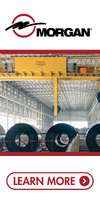SSAB to Supply Recycled Steel to Volvo Cars
06/12/2025 - Volvo Cars announced it has signed an agreement with SSAB for the supply of recycled and near-zero emissions steel for serial production deliveries beginning in 2025.
The company said the recycled steel will be used in selected components of their new fully electric EX60 SUV along with other cars based on Volvo Cars’ next generation SPA3 car architecture. The recycled steel meets the same safety requirements as primary steel in terms of strength and durability.
The closed loop system SSAB uses to recycle scrap steel significantly reduces CO2 emissions and keeps materials and natural resources in use for longer. SSAB estimates its recycled steel generates almost 100% less CO2 emissions than traditionally produced steel in Europe. It is made with a recycled content of almost 100%.
“By signing this agreement, we have taken an important step in reducing the impact on the environment and increase the awareness for using recycled materials within our supplier network,” said Francesca Gamboni, chief manufacturing and supply chain officer at Volvo Cars.
Volvo Cars said it is committed to a fully electric future and aims to achieve net-zero greenhouse gas emissions by 2040. They aim to have reduced CO2 emissions per car by 65-75% compared to 2018. They also aim to use an average of 30% recycled content across the fleet and for new car models to contain at least 35% recycled or bio-based content by 2030.
“One of the biggest sources of CO2 emissions in our production process is the steel we use to build our cars, averaging 25 percent of all material-related emissions for a new Volvo car,” said Gamboni.
The company said in addition to buying recycled and near zero-emission steel, it will also sell scrap steel to keep materials at the highest value for the longest period of time in a closed loop system.
The closed loop system SSAB uses to recycle scrap steel significantly reduces CO2 emissions and keeps materials and natural resources in use for longer. SSAB estimates its recycled steel generates almost 100% less CO2 emissions than traditionally produced steel in Europe. It is made with a recycled content of almost 100%.
“By signing this agreement, we have taken an important step in reducing the impact on the environment and increase the awareness for using recycled materials within our supplier network,” said Francesca Gamboni, chief manufacturing and supply chain officer at Volvo Cars.
Volvo Cars said it is committed to a fully electric future and aims to achieve net-zero greenhouse gas emissions by 2040. They aim to have reduced CO2 emissions per car by 65-75% compared to 2018. They also aim to use an average of 30% recycled content across the fleet and for new car models to contain at least 35% recycled or bio-based content by 2030.
“One of the biggest sources of CO2 emissions in our production process is the steel we use to build our cars, averaging 25 percent of all material-related emissions for a new Volvo car,” said Gamboni.
The company said in addition to buying recycled and near zero-emission steel, it will also sell scrap steel to keep materials at the highest value for the longest period of time in a closed loop system.



.jpg?lang=en-US&ext=.jpg)

